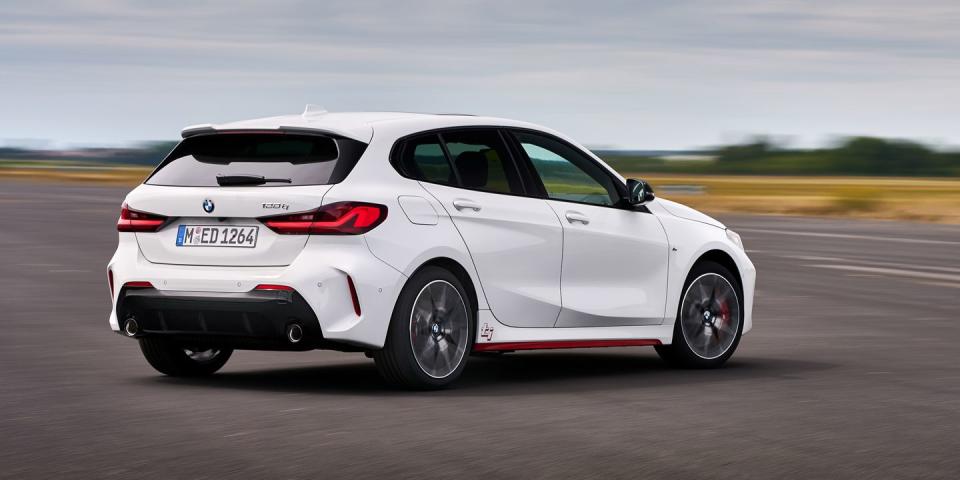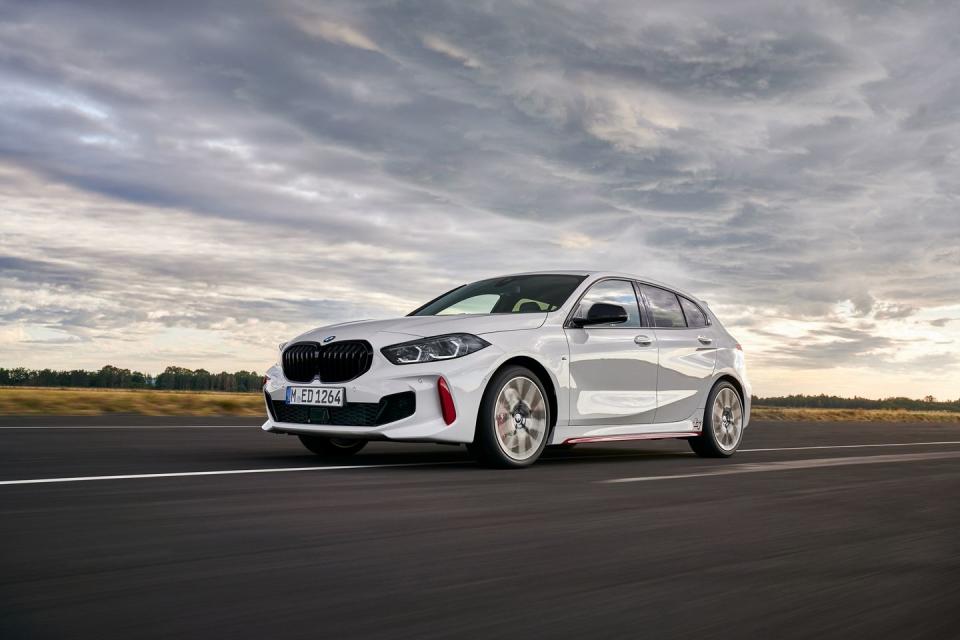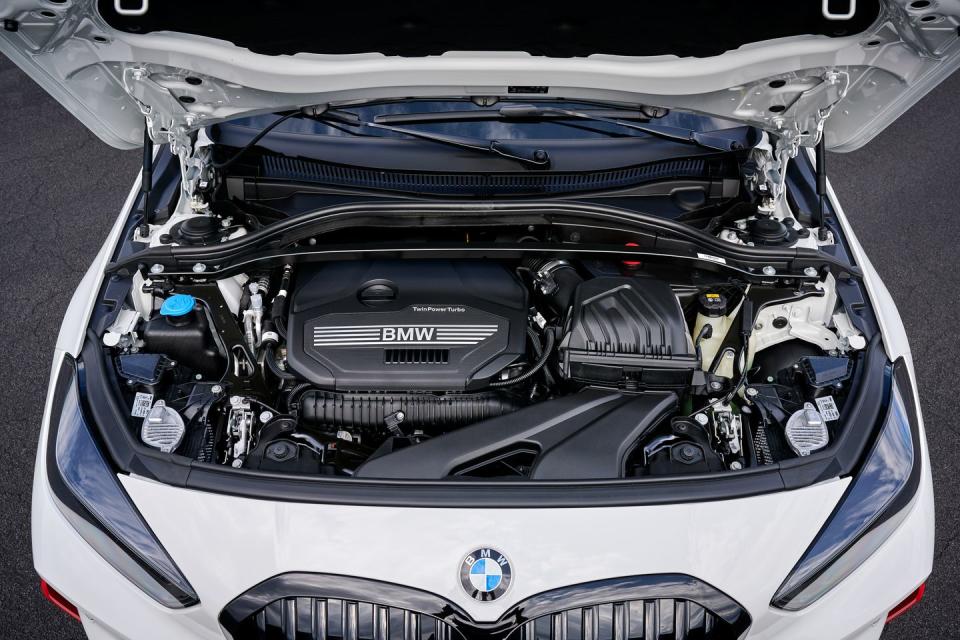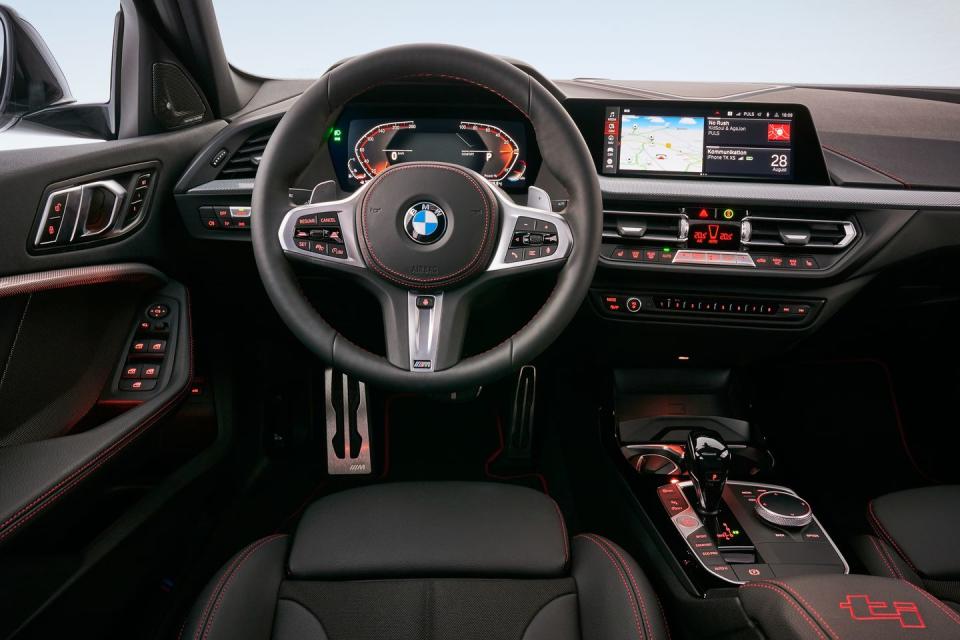2022 BMW 128ti Is a Europe-Only VW GTI Rival

Contrary to the expectations of some traditionalists, the world didn't suddenly end when BMW quietly introduced front-wheel-drive models a few years ago. The X1, X2, and 2-series Gran Coupe all ride on the company's UKL platform, shared with bigger Minis, bringing the combination of transversely mounted engines and drivetrains that pull rather than push. While all are offered with the option of xDrive in the U.S., the base "28i" versions are all front-wheel drive.
Given the marketing BMW used to put behind the dynamic purity of rear-wheel drive, it isn't surprising these models' wrong-wheel-drive configuration is barely mentioned—the configurator website features a prominent tab promoting the xDrive upgrade. But in Europe things are different. There, BMW has used the same mechanical package to create the 128ti, a front-drive hot hatch, one that positively celebrates the new driveline configuration.

The "ti" suffix is drawn deep from BMW's past. The original TI (with capital letters) was launched in 1963 as a performance version of the "Neue Klasse" sedan. The designation stood for Turismo Internazionale and brought a collection of mechanical tweaks engineered by what was then a little-known tuner called Alpina, including a 1.8-liter four-cylinder with dual carburetors and an output of 110 horsepower. A lower-case ti version of the 2002 coupe followed, with the later fuel-injected version becoming, with Germanic logic, the tii. After a long lapse, ti branding was brought back for the chopped-tail variant of the E36 (and, in Europe, E46) 3-series, precursors to the first 1-series hatchback.
Today's F40-generation 1-series hatchback is effectively the 2-series Gran Coupe's utilitarian sibling: shorter in length, taller, and less fashion-conscious. The design shares the Gran Coupe's goofy front overhang and aggressively angled headlights, but the rear hatchback appears both simpler and more elegant than the four-door coupe's baroque derriere. Whereas the range-topping M135i xDrive uses the same 301-hp four-cylinder engine and front-biased all-wheel-drive system as our M235i xDrive Gran Coupe, the 128ti variant you see here features a less powerful (261-hp) version of the 2.0-liter turbocharged engine and just two driven wheels. It would be sweet if European exceptionalism had also given the 128ti a manual gearbox—more basic versions of the F40 are still available with a stick—but sadly the only transmission option is an eight-speed torque-converter automatic.

Despite that, the driving experience is impressively raw and unfiltered. Fears that BMW might try to disguise which axle is driven are disproved by the first dose of full throttle, as the 128ti scrambles for traction when launched hard. Bumpy surfaces also produce the unmistakable sensation of torque affecting the steering, although in an exciting rather than a wayward way. A limited-slip differential and quick-acting traction control ensure the driven wheels fight for a common cause rather than battle each other. The steering delivers keen response and a level of feedback unfamiliar in a modern BMW outside of those that wear an M badge.
Although 19-inch wheels are optional, our sample car rode on the standard 18-inch alloy rims shod with Michelin Pilot Sport 4 tires, which generated impressive grip on cold, greasy British asphalt. The 128ti's chassis has been given a sense of fun, its cornering line readily influenced by accelerator position. It fights understeer gamely, but excessive speed in slower, tighter corners sees the front tires run short on adhesion first. Easing off the accelerator persuades the car to rotate and tighten its line neatly, and snapping the throttle shut with enough lateral load can even bring modest oversteer. The factory-stated curb weight of 3350 pounds is hefty for a front-drive hot hatchback, but it's 100 pounds lighter than the M135i xDrive.


 Yahoo Autos
Yahoo Autos 